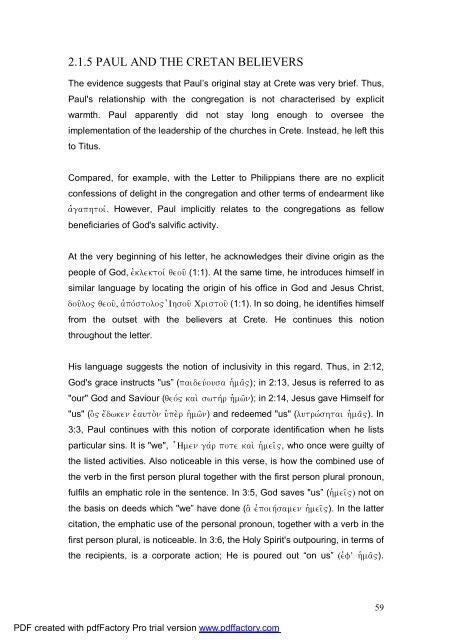A Text centred rhetorical analysis of Paul's Letter to Titus
A Text centred rhetorical analysis of Paul's Letter to Titus
A Text centred rhetorical analysis of Paul's Letter to Titus
Create successful ePaper yourself
Turn your PDF publications into a flip-book with our unique Google optimized e-Paper software.
2.1.5 PAUL AND THE CRETAN BELIEVERS<br />
The evidence suggests that Paul’s original stay at Crete was very brief. Thus,<br />
<strong>Paul's</strong> relationship with the congregation is not characterised by explicit<br />
warmth. Paul apparently did not stay long enough <strong>to</strong> oversee the<br />
implementation <strong>of</strong> the leadership <strong>of</strong> the churches in Crete. Instead, he left this<br />
<strong>to</strong> <strong>Titus</strong>.<br />
Compared, for example, with the <strong>Letter</strong> <strong>to</strong> Philippians there are no explicit<br />
confessions <strong>of</strong> delight in the congregation and other terms <strong>of</strong> endearment like<br />
ajgaph<strong>to</strong>iv. However, Paul implicitly relates <strong>to</strong> the congregations as fellow<br />
beneficiaries <strong>of</strong> God's salvific activity.<br />
At the very beginning <strong>of</strong> his letter, he acknowledges their divine origin as the<br />
people <strong>of</strong> God, ejklek<strong>to</strong>iv qeou' (1:1). At the same time, he introduces himself in<br />
similar language by locating the origin <strong>of</strong> his <strong>of</strong>fice in God and Jesus Christ,<br />
dou`lo" qeou`, ajpovs<strong>to</strong>lo" jIhsou` Cris<strong>to</strong>u' (1:1). In so doing, he identifies himself<br />
from the outset with the believers at Crete. He continues this notion<br />
throughout the letter.<br />
His language suggests the notion <strong>of</strong> inclusivity in this regard. Thus, in 2:12,<br />
God's grace instructs "us” (paideuvousa hJma`"); in 2:13, Jesus is referred <strong>to</strong> as<br />
"our" God and Saviour (qeov~ kai; swthvr hJmw`n); in 2:14, Jesus gave Himself for<br />
"us" (o}" e[dwken eJau<strong>to</strong>;n uJpe;r hJmw`n) and redeemed "us" (lutrwvshtai hJma`"). In<br />
3:3, Paul continues with this notion <strong>of</strong> corporate identification when he lists<br />
particular sins. It is "we", \Hmen gavr pote kai; hJmei`", who once were guilty <strong>of</strong><br />
the listed activities. Also noticeable in this verse, is how the combined use <strong>of</strong><br />
the verb in the first person plural <strong>to</strong>gether with the first person plural pronoun,<br />
fulfils an emphatic role in the sentence. In 3:5, God saves "us” (hJmei`") not on<br />
the basis on deeds which "we” have done (a} ejpoihvsamen hJmei`"). In the latter<br />
citation, the emphatic use <strong>of</strong> the personal pronoun, <strong>to</strong>gether with a verb in the<br />
first person plural, is noticeable. In 3:6, the Holy Spirit's outpouring, in terms <strong>of</strong><br />
the recipients, is a corporate action; He is poured out “on us” (ejfÆ hJma`").<br />
PDF created with pdfFac<strong>to</strong>ry Pro trial version www.pdffac<strong>to</strong>ry.com<br />
59

















